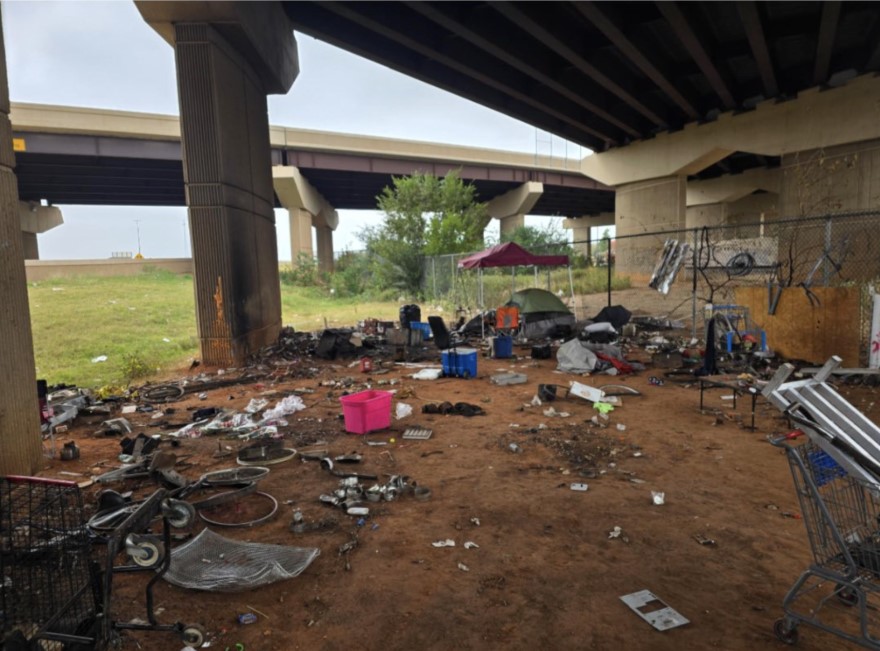OKLAHOMA CITY — Oklahoma Gov. Kevin Stitt announced Monday he is duplicating in Oklahoma City a program he recently used to remove homeless people from the streets of Tulsa.
Stitt said Monday that the Oklahoma Highway Patrol (OHP) and the Oklahoma Department of Transportation (ODOT) had already begun what he called Operation SAFE (Swift Action for Families Everywhere) in Oklahoma City.
Law enforcement dismantled homeless encampments from state-owned property within Oklahoma City limits, from areas like underpasses, highways, state buildings and other state-controlled land.
The unhoused were offered rides to treatment or housing facilities; if they refused, law enforcement would take them to jail.
“After the success of Operation SAFE in Tulsa, business leaders and stakeholders quickly requested the state to do the same here in Oklahoma City,” said Gov. Stitt. “We are partnering with Key to Home, an Oklahoma City-based public/private partnership, to connect those individuals we move from state property to services and housing. The state is doing its job, and just like in Tulsa, it’s the role of the city and non-profits to ensure Oklahoma City stays clean and safe for all residents.”
Key to Home Partnership was established in 2023. Today, more than 50 public, private, and nonprofit partners work together to bring outreach teams directly into encampments, connecting Oklahomans in need to shelter, treatment, and housing within an expedited six-week timeline. Once an encampment is closed, ongoing monitoring prevents repopulation. To date, Key to Home has helped 446 people transition into housing and successfully closed 25 encampments across the city.
“We’ve worked hard to coordinate efforts more effectively and create a streamlined pathway to restoration for our neighbors who are sleeping outside,” said Jamie Caves, Homeless Strategy Implementation Manager for the Key to Home Partnership. “When the State approached us about addressing encampments on State property, the program was already in place to offer a quick, effective, and dignified solution.”
In September, Tulsa Mayor Monroe Nichols characterized Operation SAFE in Tulsa as little more than political theater, as Tulsa has already implemented a multi-million-dollar, holistic plan to reduce homelessness on city streets.
“There was zero coordination when it came to this particular action by the governor,” Nichols said in an interview with News 6 in Tulsa. “I think that’s what’s so frustrating for everybody is that you do this, you displace people. There’s no strategy around getting them housed. There’s no real strategy around them getting services. There’s not been one arrest, there’s not been one person they’ve transported to get a service.
“And so it has been the kind of interruption that will have a public safety impact because you’ve taken a lot of people, you’ve kind of interrupted them, and you’ve just said you can’t be here, but go on and we don’t know what’s gonna happen to you.”
State Senator Julia Kirt, D-Oklahoma City, also questioned the efficacy of the governor’s approach.
“The governor just put on this political show in Tulsa and there is no evidence that it actually solved any real problems,” said Kirt. “We all want the same thing – to reduce homelessness and make our communities safer. But these short-sighted solutions do nothing but waste taxpayer dollars.
“We know the answer – it’s affordable housing, access to community-based mental health services, and a living wage. Until those issues are addressed, nothing will really change,” Kirt said.
Oklahoma City Mayor David Holt issued a statement praising the work Key to Home has already done toward reducing homelessness in Oklahoma City.
“Key to Home has taken nearly 500 people off the streets in a sustainable way that doesn’t just move people around,” said Holt. “And Key to Home is a major reason why Oklahoma City’s unsheltered homeless population has declined four years in a row.”





